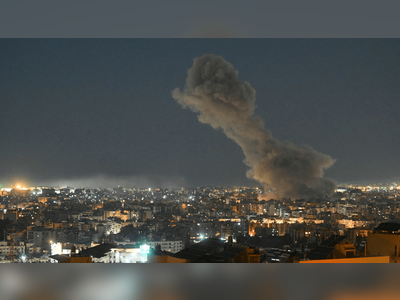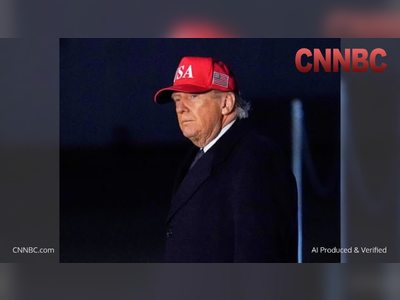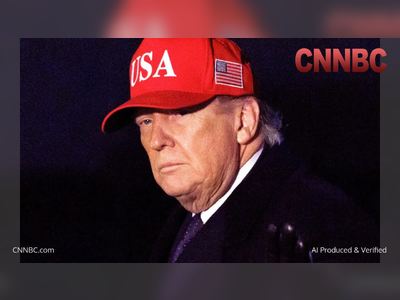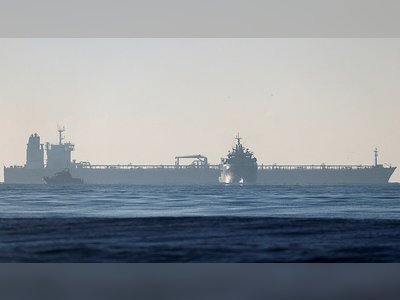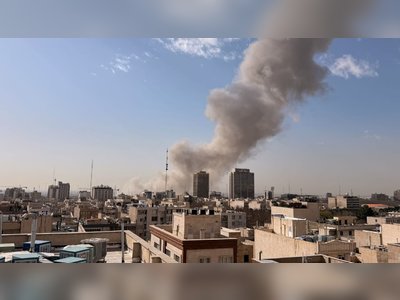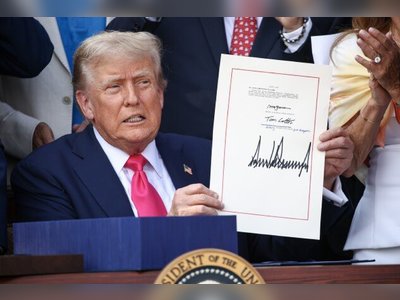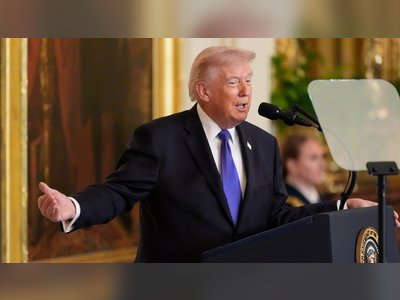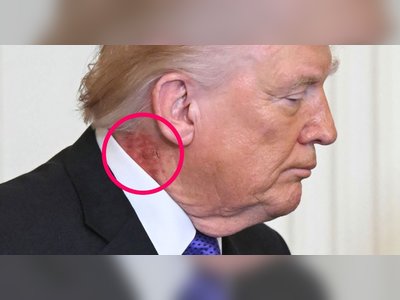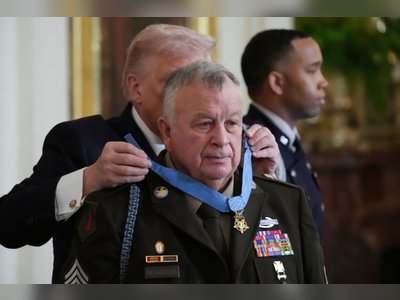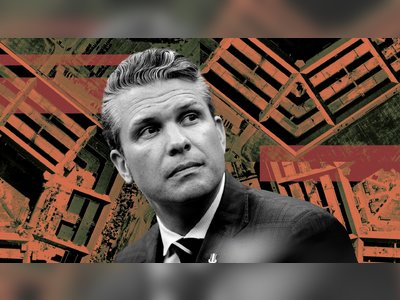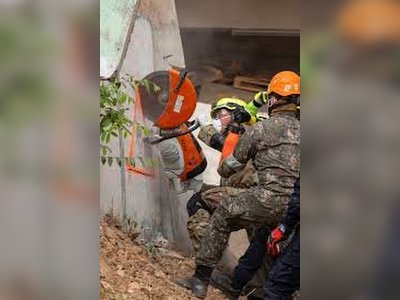
Zelenskyy Warns against NATO Membership Ruling, Starmer Envisions Military Plans for Ukraine Peacekeeping
Ukrainian President Volodymyr Zelenskyy cautions that dismissing NATO membership could benefit Russia, while UK Prime Minister Keir Starmer outlines military preparations for potential peacekeeping efforts.
Ukrainian President Volodymyr Zelenskyy has declared that ruling out NATO membership for Ukraine would represent a substantial 'gift' to Russia, emphasizing the importance of the alliance in safeguarding Ukraine's sovereignty.
During a press conference with European Union leaders, he reaffirmed Ukraine's stance that Crimea is unequivocally 'a Ukrainian peninsula' and rejected any notion of territorial concessions to Moscow as part of a peace agreement.
Zelenskyy further articulated that 'all nuclear power plants belong to the people of Ukraine' in response to recent suggestions that the United States could take over the management of Ukraine's nuclear facilities.
In a parallel development, UK Prime Minister Keir Starmer stated that a meeting of defense chiefs is set to translate the concept of a peacekeeping force for Ukraine from political discussion to actionable military plans.
Starmer indicated that the urgency for these plans is heightened by ongoing talks between the United States and Russia regarding a potential ceasefire agreement.
He emphasized the need for readiness to respond to any unfolding situation, noting that discussions among nearly 30 political leaders had initiated a shift in focus towards tangible military strategies aimed at securing the airspace and borders of Ukraine.
Starmer commented on the strategic importance of converting political momentum into military readiness to deter further Russian aggression if a peace deal is reached.
The military chiefs' meeting aims to explore the operational feasibility of deploying peacekeepers in Ukraine, potentially involving redeployment of British forces currently stationed in NATO's eastern flank, supplemented by contributions from other allied nations.
Despite ongoing discussions, recent communications among U.S. President Donald Trump, Russian President Vladimir Putin, and Zelenskyy have not yielded the anticipated 30-day ceasefire.
Putin has agreed to a limited truce concerning energy infrastructure; however, Ukraine asserts that Russian forces have continued to strike civilian targets, including hospitals.
UK Foreign Secretary David Lammy has urged Putin to agree to a comprehensive ceasefire, aligning with proposals from Washington and Kyiv as attacks persist across Ukraine.
In an address to EU leaders during their summit in Brussels, Zelenskyy expressed cautious optimism about achieving a 'lasting peace' within the year, correlating this belief with his dialogue with Trump.
The former U.S. president had suggested U.S. oversight of Ukrainian power plants for enhanced security, a proposal to which Starmer responded that it was 'a matter for them'.
Reports indicate a significant uptick in Russian drone attacks, with Zelenskyy stating that around 200 Shahed drones were deployed in a recent offensive in the Kirovohrad region, resulting in injuries to ten civilians, including four children.
The attacks have caused substantial damage to residential areas, churches, and critical infrastructure.
According to updated assessments from British military intelligence, the Russian military has incurred an estimated 200,000 to 250,000 soldier deaths since the onset of the invasion in 2022, marking the highest casualty counts for Russia since World War II. The Ministry of Defence reported an overall casualty estimate of approximately 900,000, including wounded personnel.
The analysis suggested that the Russian military command prioritizes operational objectives over the lives of soldiers and appears willing to endure high casualty rates as long as public and elite support for the conflict remains intact.
During a press conference with European Union leaders, he reaffirmed Ukraine's stance that Crimea is unequivocally 'a Ukrainian peninsula' and rejected any notion of territorial concessions to Moscow as part of a peace agreement.
Zelenskyy further articulated that 'all nuclear power plants belong to the people of Ukraine' in response to recent suggestions that the United States could take over the management of Ukraine's nuclear facilities.
In a parallel development, UK Prime Minister Keir Starmer stated that a meeting of defense chiefs is set to translate the concept of a peacekeeping force for Ukraine from political discussion to actionable military plans.
Starmer indicated that the urgency for these plans is heightened by ongoing talks between the United States and Russia regarding a potential ceasefire agreement.
He emphasized the need for readiness to respond to any unfolding situation, noting that discussions among nearly 30 political leaders had initiated a shift in focus towards tangible military strategies aimed at securing the airspace and borders of Ukraine.
Starmer commented on the strategic importance of converting political momentum into military readiness to deter further Russian aggression if a peace deal is reached.
The military chiefs' meeting aims to explore the operational feasibility of deploying peacekeepers in Ukraine, potentially involving redeployment of British forces currently stationed in NATO's eastern flank, supplemented by contributions from other allied nations.
Despite ongoing discussions, recent communications among U.S. President Donald Trump, Russian President Vladimir Putin, and Zelenskyy have not yielded the anticipated 30-day ceasefire.
Putin has agreed to a limited truce concerning energy infrastructure; however, Ukraine asserts that Russian forces have continued to strike civilian targets, including hospitals.
UK Foreign Secretary David Lammy has urged Putin to agree to a comprehensive ceasefire, aligning with proposals from Washington and Kyiv as attacks persist across Ukraine.
In an address to EU leaders during their summit in Brussels, Zelenskyy expressed cautious optimism about achieving a 'lasting peace' within the year, correlating this belief with his dialogue with Trump.
The former U.S. president had suggested U.S. oversight of Ukrainian power plants for enhanced security, a proposal to which Starmer responded that it was 'a matter for them'.
Reports indicate a significant uptick in Russian drone attacks, with Zelenskyy stating that around 200 Shahed drones were deployed in a recent offensive in the Kirovohrad region, resulting in injuries to ten civilians, including four children.
The attacks have caused substantial damage to residential areas, churches, and critical infrastructure.
According to updated assessments from British military intelligence, the Russian military has incurred an estimated 200,000 to 250,000 soldier deaths since the onset of the invasion in 2022, marking the highest casualty counts for Russia since World War II. The Ministry of Defence reported an overall casualty estimate of approximately 900,000, including wounded personnel.
The analysis suggested that the Russian military command prioritizes operational objectives over the lives of soldiers and appears willing to endure high casualty rates as long as public and elite support for the conflict remains intact.

